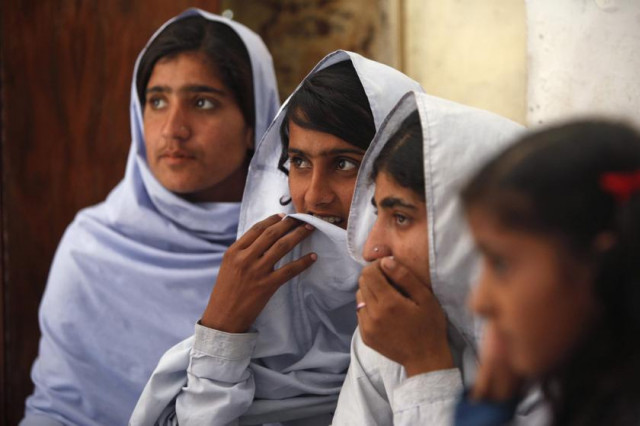'Sex education can help teens delay onset of sexual activity'
Religious scholar says sex education should focus on what is sex permissible (halal) and what is not (haram)

Students react while attending a lecture on preventive measures to take when sexual harassment occurs, during a class in Shadabad Girls Elementary School in Pir Mashaikh village in Johi, some 325km from Karachi February 12, 2014. PHOTO: REUTERS
Recent stats released by the Malaysian government that recorded 174 baby dumping cases, has raised the issue of sex education in the South Asian country. After Malaysian Deputy Minister for Women, Family and Community Development Datuk Azizah Mohammad Dun made the numbers public, Youth Chief of Pribumi Bersatu Malaysia Part Syed Saddiq Abdul Rahman took to a social networking site to urge introduction of sexual education in Malaysia - raising many eyebrows.
The Malaysian Digest spoke to religious scholar Dr Fathul Bari Mat Jahya on the relevance of sex education in the religious context.
“I do not subscribe to the notion that sex education is utterly un-Islamic,” he said. “It can be implemented in Malaysia, but the implementation must be correct.”
Why sex education can prevent cases like child abuse in Kasur
Jahya stressed that in Islam “the usage of condoms, safe sex, sexually transmitted diseases and all that should not be the focus. The focus should be on teaching these youths, on what grounds is sex permissible. In Islam, this means marriage.”
“We must always remember that the most important thing is we must teach these youths what is halal (permissible), and what is haram (prohibited),” he adds.
The Umno Youth exco explained how sex education can be introduced to the proper age group in accordance with religious values.
“It has many uses, such as teaching married couples the benefits and how-to in family planning, acceptable conduct when it comes to sexual relationships, and the healthcare of our sexual organs,” he said. “In my opinion, sex education can be taught to children who have reached mummayiz (the age at which a child can discern between right and wrong, and he or she knows of the differences between a man and a woman.)
“So, the proper age will be around 10-years-old, and not in kindergarten as some people suggested,” he emphasised.
“I don’t understand the obsession to call it sex education. We all know that in Malaysia, and in our culture and communities, the word sex itself brings negative connotations which points toward committing sexual activities,” he said on using the term “sex education”. “Calling it sex education in the first place shows that we are too happy being Westernised and accept the western term for it. We must understand that in our culture, humility and shyness is important.”
Plea against sex education at schools disposed of
“The name sex education is somewhat offensive to our sensitivities, so why not we change the name?,” he suggested. “The syllabus can be discussed and debated, but the name should be changed.”
Jahya, however, firmly believes that sex education is not the only way to fight against moral ills in the society. “We must also remember that sexual education is not the only solution that can be applied when it comes to countering our moral issues,” he said.
But is sex education only about sex? Sexual health educator June Low thinks not.
“Comprehensive sex education is aimed at helping people make more informed decisions and build healthy relationships by covering a wide range of topics that affect sexuality and sexual health,” stressed June, who is very vocal about the true meaning of sex education.
“Most people think sex education is just reproductive health but it's so much more than that. The other reason is that they might not understand how these lessons can positively impact a young person's development,” she spoke of the stigma attached to it. “Research has proven that sex education can help teens delay the onset of sexual activity, reduce the frequency of sexual activity, reduce number of sexual partners, and increase condom and contraceptive use.
Sex education covers a variety of topics including puberty, pregnancy, sexually transmitted diseases, sexual health, and sexual behaviour – all of which will help individuals, especially children make informed decisions.
June believes that it does not encourage youth towards sex but helps prevent it. “More importantly, the evidence shows that teens who receive comprehensive sex education are not more likely to become sexually active, increase sexual activity, or experience negative sexual health outcomes,” she explained.
MQM chief booked for 'sex education' speech
When asked if it may offend cultural and religious sensitivities, June said she thinks “it's too easy to say that it goes against people's sensitivities.”
“I have taught teens from very conservative and different religious backgrounds but I've never had any issues. So I think there needs to be some serious (and informed) discourse between those who are for it and those who are against it,” said June.
“In my experience it's not even a case of trying to convince either party, but a case of giving logic a chance to prevail. I think the kids themselves (if they're following the discussion) will be able to discern and see where logic lies,” she declared.
“I'm not too worried about people's sensitivities. I am mainly disappointed that we have not had an opportunity to talk about this in mature fashion so that a solution may be found,” she said. “From the reported statistics alone, we can clearly see that the current system is failing our children, so what I do worry about is when/if those in power will ever come around to find a workable solution to the problems, instead of just harping on about these sensitivities all the time.”
This article originally appeared on The Malaysian Digest.



















COMMENTS
Comments are moderated and generally will be posted if they are on-topic and not abusive.
For more information, please see our Comments FAQ